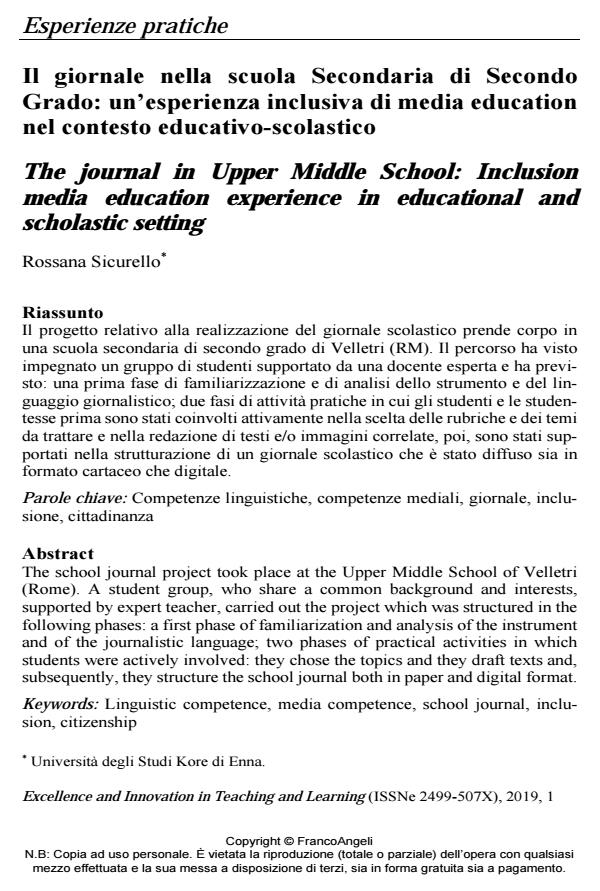The journal in Upper Middle School: Inclusion media education experience in educational and scholastic setting
Journal title EXCELLENCE AND INNOVATION IN LEARNING AND TEACHING
Author/s Rossana Sicurello
Publishing Year 2019 Issue 2019/1
Language Italian Pages 19 P. 122-140 File size 231 KB
DOI 10.3280/EXI2019-001008
DOI is like a bar code for intellectual property: to have more infomation
click here
Below, you can see the article first page
If you want to buy this article in PDF format, you can do it, following the instructions to buy download credits

FrancoAngeli is member of Publishers International Linking Association, Inc (PILA), a not-for-profit association which run the CrossRef service enabling links to and from online scholarly content.
The school journal project took place at the Upper Middle School of Velletri (Rome). A student group, who share a common background and interests, supported by expert teacher, carried out the project which was structured in the following phases: a first phase of familiarization and analysis of the instrument and of the journalistic language; two phases of practical activities in which students were actively involved: they chose the topics and they draft texts and, subsequently, they structure the school journal both in paper and digital format.
Keywords: Linguistic competence, media competence, school journal, in-clusion, citizenship
- Bonaiuti, G., Calvani, A., Menichetti, L., & Vivanet, G. (2017). Le tecnologie educative. Criteri per una scelta basata su evidenze. Roma: Carocci.
- Batini, F. (2012). Il diario di bordo. In Bartolini A. (a cura di), Artisti dell’educazione. La professionalità educativa tra necessità e possibilità (pp. 135-152). Roma: Aracne.
- Bion, W. R. (1972). Apprendere dall’esperienza. Roma: Armando.
- Brown, C. (2017). Achieving evidence-informed policy and practice in education: Evidenced. Bingley, UK: Emerald Publishing Limited.
- Calvani, A., Fini, A., & Ranieri, M. (2011). Valutare la competenza digitale. Trento: Erickson.
- Caputo, A. (2011). Metodi narrativi per la formazione degli insegnanti: il diario di bordo. FOR Rivista per la formazione, 89, 95-99. DOI: 10.3280/FOR2011-089015
- Carretero, S., Vuorikari, R., & Punie, Y. (2017). DigComp 2.1: The Digital Competence Framework for Citizens. With Eight Proficiency Levels and Examples of Use. Luxembourg: Publication Office of the European Union.
- Ceretti, F., Felini, D., & Giannatelli, R. (2006). Primi passi nella media education. Curricolo di educazione ai media per la scuola primaria. Trento: Erickson.
- Commissione Europea (2010). Comunicazione della Commissione. Europa 2020. Una strategia per una crescita intelligente, sostenibile e inclusiva (COM(2010) 2020).
- Consiglio dell’Unione Europea (2018). Raccomandazione del Consiglio relativa alle competenze chiave per l’apprendimento permanente (2018/C 189/01).
- Ferrari, A., Neža Brečko, B., & Punie, Y. (2013). DIGCOMP: a Framework for Developing and Understanding Digital Competence in Europe. Luxembourg: Publications Office of the European Union.
- Hattie, J. (2012). Visible Learning for teachers. Maximizing impact on learning. New York: Routledge.
- Hattie, J. (2009). Visible Learning. A synthesis of over 800 meta-analyses relating to achievement. New York: Routledge.
- Krueger, R. A. (1994). Focus groups. A Practical Guide for Applied Research. Thousand Oaks: Sage Publications.
- Losito, G. (1993). L’analisi del contenuto nella ricerca sociale. Milano: FrancoAngeli.
- Marzano, R.J., Pickering, D., & Pollock, J.E. (2001). Classroom Instruction That Works: Research-Based Strategies for Increasing Student Achievement. Alexandria: ASCD.
- Nelson, J., & Campbel, C. (2017). Evidence-Informed Practice in education: meanings and applications. Educational Research, 59(2), 127-135. DOI: 10.1080/00131881.2017.1314115
- Parlamento Europeo e Consiglio dell’Unione Europea (2006). Raccomandazione del Parlamento europeo e del Consiglio relativa a competenze chiave per l’apprendimento permanente (2006/962/CE).
- Parola, A. (2015). Il monitoraggio dei percorsi media-educativi. In Felini D., & Trichero R. (a cura di), Progettare la media education. Dall’idea all’azione, nella scuola e nei servizi educativi (pp. 159-179). Milano: FrancoAngeli.
- Parola, A. (2014). Media Education e valutazione. Form@re, 14(4), 50-61.
- Parola, A., & Trinchero, R. (2006). Come valutare i percorsi di media education. In Ceretti F., Felini D., & Giannatelli R. (a cura di), Primi passi nella media education (pp. 33-49). Trento: Erickson.
- Parola, A., Rosa, A., & Giannatelli, R. (2013). Media, linguaggi, creatività. Un curricolo di media education per la scuola secondaria di primo grado. Trento: Erickson.
- Redecker, C. (2017). European Framework for the Digital Competence of Educators: DigCompEdu. Luxembourg: Publication Office of the European Union.
- Trinchero, R. (2012). Costruire, valutare, certificare competenze. Milano: FrancoAngeli.
- Vivanet, G. (2016). Tecnologie didattiche, tra evidenze di ricerca e criticità evidenti. Le questioni in gioco. In Gola E., & Piredda G. (a cura di), Natural Born Pedagogy. Approcci filosofici e sperimentali alla pedagogia digitale. Milano: Guerini Scientifica.
- Vuorikari, R., Punie, Y., Carretero, S., & van den Brande, G. (2016). DigComp 2.0: The Digital Competence Framework for Citizens. Update Phase 1: The Conceptual Reference Model. Luxembourg: Publication Office of the European Union.
- World Economic Forum (2015). The Global Competitiveness Report 2015-2016. Geneva: World Economic Forum.
- Zammuner, V. L. (2003). I focus group. Bologna: il Mulino.
Rossana Sicurello, Il giornale nella scuola Secondaria di Secondo Grado: un’esperienza inclusiva di media education nel contesto educativo-scolastico in "EXCELLENCE AND INNOVATION IN LEARNING AND TEACHING" 1/2019, pp 122-140, DOI: 10.3280/EXI2019-001008